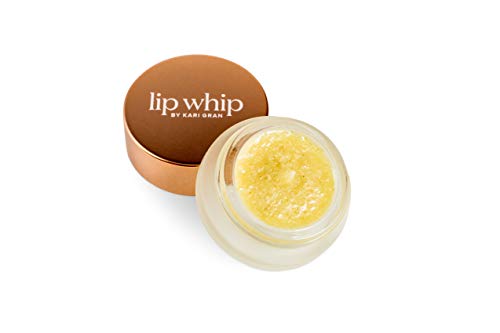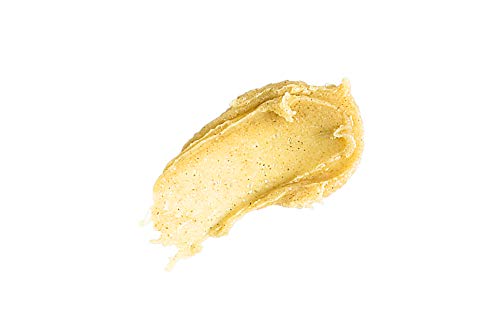


Kari Gran Lip Whip - Moisturizing Scrub with Organic Oils, Hydrates & Exfoliates - Peppermint 0.5oz


Mentha Piperita (Peppermint) Oil
High RiskMentha piperita (peppermint) oil is a volatile oil extracted from the leaves of the peppermint plant, known for its strong aroma and flavor. It is commonly used in cosmetics and personal care products for its cooling properties and fragrance enhancement.
Sustai Insights
Peppermint oil offers functional benefits such as antimicrobial properties and a soothing sensation on the skin. However, it is associated with a high potential for allergies and skin irritation. Regulatory bodies impose certain restrictions on its use due to these concerns. The overall risk level is assessed as high, warranting caution in usage, especially for sensitive populations. Alternatives like spearmint oil may provide similar benefits with potentially lower irritation risks.
Ricinus Communis (Castor) Seed Oil
Medium RiskCastor oil is extracted from the seeds of Ricinus communis and is commonly used in cosmetic and personal care products for its moisturizing and emollient properties. It is known for its ability to enhance skin absorption and provide a protective barrier.
Sustai Insights
Castor oil offers functional benefits as a moisturizer and emollient, enhancing skin absorption and providing a barrier against moisture loss. It is sustainably sourced and biodegradable. However, potential health risks include low levels of irritation and moderate concerns regarding developmental and reproductive toxicity. Environmental risks are low, with no significant pollutant or bioaccumulation concerns reported. Regulatory status shows no current restrictions. Overall, the risk level is assessed as medium, with recommendations for safe usage practices, and potential alternatives include other plant-based oils.
Persea Gratissima (Avocado) Oil
Low RiskPersea gratissima (avocado) oil is derived from the fruit of the avocado tree. It is commonly used in cosmetic formulations for its moisturizing properties, serving as an emollient that enhances skin hydration and improves product texture.
Sustai Insights
Avocado oil offers functional benefits as a moisturizer and emollient, known for its ability to nourish and hydrate the skin. It is sustainably sourced and biodegradable. Health risks are minimal, with low concerns regarding carcinogenicity, allergies, and reproductive toxicity. Environmental risks are also low, with no significant pollutant or bioaccumulation potential. Regulatory bodies have not issued warnings against its use. Overall, the ingredient is assessed as low risk, making it a safe choice for cosmetic applications.
Sucrose
Low RiskSucrose is a naturally occurring disaccharide, commonly known as table sugar. It is derived from various plants, primarily sugar cane and sugar beet, and serves as a sweetening agent in a variety of food and cosmetic products.
Sustai Insights
Sucrose is effective as a sweetener and humectant, providing moisture retention in formulations. It is biodegradable and generally recognized as safe, with low concerns regarding carcinogenicity, allergies, and reproductive toxicity. However, excessive consumption can lead to health issues like obesity and diabetes. Environmentally, sucrose poses minimal pollution risk and is not bioaccumulative. Regulatory bodies do not impose significant restrictions on its use. Overall, sucrose presents a low risk when utilized appropriately.
Beeswax
Low RiskBeeswax is the purified wax obtained from the honeycomb of honeybees. It is typically used as a thickening agent, emulsifier, or to provide structure in various cosmetic and personal care products.
Sustai Insights
Beeswax offers functional benefits as a natural emulsifier and thickening agent, contributing to product stability and texture. It is biodegradable and sustainably sourced, aligning with eco-friendly practices. Health risks are low, with minimal concerns regarding carcinogenicity, allergies, or irritation. Environmental risks are also low, with no significant pollutant or bioaccumulation issues. Regulatory bodies impose few restrictions, confirming its safety in use. Safe usage practices should be followed, and alternatives like plant-based waxes may be considered for those seeking vegan options. Overall, the risk level associated with beeswax is low.
Chamomilla Recutita (Chamomile) Flower Powder
Low RiskChamomilla recutita (chamomile) flower powder is derived from the flowers of the chamomile plant, commonly used in cosmetics for its soothing and anti-inflammatory properties. It is often included in formulations for its potential benefits to skin health and appearance.
Sustai Insights
Chamomile flower powder offers functional benefits such as anti-inflammatory and calming effects, making it suitable for sensitive skin formulations. It is sustainably sourced and biodegradable. Health risks are low, with minimal concerns regarding cancer, allergies, or reproductive toxicity. Environmental risks are also low, and regulatory bodies impose few restrictions. Overall, chamomile flower powder presents a low risk profile, making it a favorable ingredient in cosmetic formulations.
Tocopherol
Low RiskTocopherols are a class of naturally occurring compounds, primarily known for their role as antioxidants. They are commonly used in cosmetic and skincare products to help stabilize formulations and protect ingredients from oxidative damage.
Sustai Insights
Tocopherols provide functional benefits such as antioxidant protection and skin conditioning. They are generally recognized as safe, with low concerns regarding carcinogenicity, allergies, and reproductive toxicity. However, enhanced skin absorption and potential endocrine disruption are noted. Regulatory bodies have not imposed significant restrictions on tocopherols, categorizing the overall risk as low. Safe usage practices should be observed, and while alternatives exist, tocopherols remain a viable option in formulations.
Simmondsia Chinensis (Jojoba) Seed Oil
Low RiskSimmondsia chinensis (jojoba) seed oil is extracted from the seeds of the jojoba plant. It is commonly used in cosmetics for its moisturizing properties and ability to mimic human sebum, making it beneficial for skin and hair care formulations.
Sustai Insights
Jojoba seed oil offers functional benefits such as effective moisturization and emollience, contributing to skin hydration and smoothness. It is sustainably sourced and biodegradable. Health risks are low, with minimal concerns regarding carcinogenicity, allergies, and reproductive toxicity. Environmental risks are also low, as it does not significantly contribute to pollution or bioaccumulation. Currently, there are no regulatory restrictions on its use. Overall, the risk level is low, and it is considered a safe ingredient with no significant adverse effects.
Persea Gratissima (Avocado) Oil
Low RiskPersea gratissima (avocado) oil is derived from the fruit of the avocado tree. It is commonly used in cosmetic formulations for its moisturizing properties, serving as an emollient that enhances skin hydration and improves product texture.
Sustai Insights
Avocado oil offers functional benefits as a moisturizer and emollient, known for its ability to nourish and hydrate the skin. It is sustainably sourced and biodegradable. Health risks are minimal, with low concerns regarding carcinogenicity, allergies, and reproductive toxicity. Environmental risks are also low, with no significant pollutant or bioaccumulation potential. Regulatory bodies have not issued warnings against its use. Overall, the ingredient is assessed as low risk, making it a safe choice for cosmetic applications.
Sucrose
Low RiskSucrose is a naturally occurring disaccharide, commonly known as table sugar. It is derived from various plants, primarily sugar cane and sugar beet, and serves as a sweetening agent in a variety of food and cosmetic products.
Sustai Insights
Sucrose is effective as a sweetener and humectant, providing moisture retention in formulations. It is biodegradable and generally recognized as safe, with low concerns regarding carcinogenicity, allergies, and reproductive toxicity. However, excessive consumption can lead to health issues like obesity and diabetes. Environmentally, sucrose poses minimal pollution risk and is not bioaccumulative. Regulatory bodies do not impose significant restrictions on its use. Overall, sucrose presents a low risk when utilized appropriately.
Beeswax
Low RiskBeeswax is the purified wax obtained from the honeycomb of honeybees. It is typically used as a thickening agent, emulsifier, or to provide structure in various cosmetic and personal care products.
Sustai Insights
Beeswax offers functional benefits as a natural emulsifier and thickening agent, contributing to product stability and texture. It is biodegradable and sustainably sourced, aligning with eco-friendly practices. Health risks are low, with minimal concerns regarding carcinogenicity, allergies, or irritation. Environmental risks are also low, with no significant pollutant or bioaccumulation issues. Regulatory bodies impose few restrictions, confirming its safety in use. Safe usage practices should be followed, and alternatives like plant-based waxes may be considered for those seeking vegan options. Overall, the risk level associated with beeswax is low.
Mentha Piperita (Peppermint) Oil
High RiskMentha piperita (peppermint) oil is a volatile oil extracted from the leaves of the peppermint plant, known for its strong aroma and flavor. It is commonly used in cosmetics and personal care products for its cooling properties and fragrance enhancement.
Sustai Insights
Peppermint oil offers functional benefits such as antimicrobial properties and a soothing sensation on the skin. However, it is associated with a high potential for allergies and skin irritation. Regulatory bodies impose certain restrictions on its use due to these concerns. The overall risk level is assessed as high, warranting caution in usage, especially for sensitive populations. Alternatives like spearmint oil may provide similar benefits with potentially lower irritation risks.
Chamomilla Recutita (Chamomile) Flower Powder
Low RiskChamomilla recutita (chamomile) flower powder is derived from the flowers of the chamomile plant, commonly used in cosmetics for its soothing and anti-inflammatory properties. It is often included in formulations for its potential benefits to skin health and appearance.
Sustai Insights
Chamomile flower powder offers functional benefits such as anti-inflammatory and calming effects, making it suitable for sensitive skin formulations. It is sustainably sourced and biodegradable. Health risks are low, with minimal concerns regarding cancer, allergies, or reproductive toxicity. Environmental risks are also low, and regulatory bodies impose few restrictions. Overall, chamomile flower powder presents a low risk profile, making it a favorable ingredient in cosmetic formulations.
Ricinus Communis (Castor) Seed Oil
Medium RiskCastor oil is extracted from the seeds of Ricinus communis and is commonly used in cosmetic and personal care products for its moisturizing and emollient properties. It is known for its ability to enhance skin absorption and provide a protective barrier.
Sustai Insights
Castor oil offers functional benefits as a moisturizer and emollient, enhancing skin absorption and providing a barrier against moisture loss. It is sustainably sourced and biodegradable. However, potential health risks include low levels of irritation and moderate concerns regarding developmental and reproductive toxicity. Environmental risks are low, with no significant pollutant or bioaccumulation concerns reported. Regulatory status shows no current restrictions. Overall, the risk level is assessed as medium, with recommendations for safe usage practices, and potential alternatives include other plant-based oils.
Tocopherol
Low RiskTocopherols are a class of naturally occurring compounds, primarily known for their role as antioxidants. They are commonly used in cosmetic and skincare products to help stabilize formulations and protect ingredients from oxidative damage.
Sustai Insights
Tocopherols provide functional benefits such as antioxidant protection and skin conditioning. They are generally recognized as safe, with low concerns regarding carcinogenicity, allergies, and reproductive toxicity. However, enhanced skin absorption and potential endocrine disruption are noted. Regulatory bodies have not imposed significant restrictions on tocopherols, categorizing the overall risk as low. Safe usage practices should be observed, and while alternatives exist, tocopherols remain a viable option in formulations.
Simmondsia Chinensis (Jojoba) Seed Oil
Low RiskSimmondsia chinensis (jojoba) seed oil is extracted from the seeds of the jojoba plant. It is commonly used in cosmetics for its moisturizing properties and ability to mimic human sebum, making it beneficial for skin and hair care formulations.
Sustai Insights
Jojoba seed oil offers functional benefits such as effective moisturization and emollience, contributing to skin hydration and smoothness. It is sustainably sourced and biodegradable. Health risks are low, with minimal concerns regarding carcinogenicity, allergies, and reproductive toxicity. Environmental risks are also low, as it does not significantly contribute to pollution or bioaccumulation. Currently, there are no regulatory restrictions on its use. Overall, the risk level is low, and it is considered a safe ingredient with no significant adverse effects.
Discover the Kari Gran Lip Whip, a luxurious lip scrub that gently exfoliates while delivering deep hydration. Infused with organic oils and a refreshing peppermint scent, this non-GMO, paraben-free formula transforms your lip care routine into a pampering experience.
- Gentle Exfoliation: Organic sugar and chamomile powder work together to create a smooth canvas, effortlessly removing dry skin and existing lip color.
- Nourishing Ingredients: Packed with organic oils like castor, jojoba, and avocado, this scrub hydrates and protects, leaving lips soft and supple.
- Versatile Use: Can double as a lip mask; simply massage onto lips and let the nourishing oils soak in for a few minutes for enhanced hydration.
- Ethical Choice: Proudly made in Seattle, this women-owned brand prioritizes sustainability and cruelty-free practices, aligning with eco-conscious values.
- Easy Application: Simple to use—massage onto clean, dry lips, rinse off, and follow with your favorite lip balm for lasting moisture.
Embrace healthy, beautiful lips with the Kari Gran Lip Whip, where quality meets sustainability.
Subscribe & Save with Sustai
- Best Price Guarantee: Always enjoy the lowest prices on sustainable home essentials.
- No Surprises: We’ll notify you before shipping. No hidden fees, ever.
- You’re in Charge: Change, pause, or cancel your subscription anytime with ease.
- Eco-Friendly Deliveries: Our grouped shipments mean less packaging and lower emissions.
Join us on a sustainable journey. Special offers for a limited time! Prices and promotions may change.
Recommended Products
Discover the Kari Gran Lip Whip, a luxurious lip scrub that gently exfoliates while delivering deep hydration. Infused with organic oils and a refreshing peppermint scent, this non-GMO, paraben-free formula transforms your lip care routine into a pampering experience.
- Gentle Exfoliation: Organic sugar and chamomile powder work together to create a smooth canvas, effortlessly removing dry skin and existing lip color.
- Nourishing Ingredients: Packed with organic oils like castor, jojoba, and avocado, this scrub hydrates and protects, leaving lips soft and supple.
- Versatile Use: Can double as a lip mask; simply massage onto lips and let the nourishing oils soak in for a few minutes for enhanced hydration.
- Ethical Choice: Proudly made in Seattle, this women-owned brand prioritizes sustainability and cruelty-free practices, aligning with eco-conscious values.
- Easy Application: Simple to use—massage onto clean, dry lips, rinse off, and follow with your favorite lip balm for lasting moisture.
Embrace healthy, beautiful lips with the Kari Gran Lip Whip, where quality meets sustainability.

You can have at most 2 Sustainable Steals products in your cart
Customer Reviews
Customers’ View
Customers express strong appreciation for the Kari Gran Lip Scrub, highlighting its effectiveness in providing gentle exfoliation while keeping lips hydrated. Many users note its pleasant whipped texture and the ease of application, making it a convenient addition to their lip care routine. The product's natural and organic ingredients resonate well with health-conscious consumers, with several reviews underscoring the importance of its cruelty-free and sustainable formulation. One customer mentioned, 'It feels thick and healing, perfect for cracked lips.' Overall, customers find this lip scrub to be a reliable and nourishing choice that aligns with their eco-friendly values.
AI-generated from the text of customer reviewsThis product has no reviews yet.





